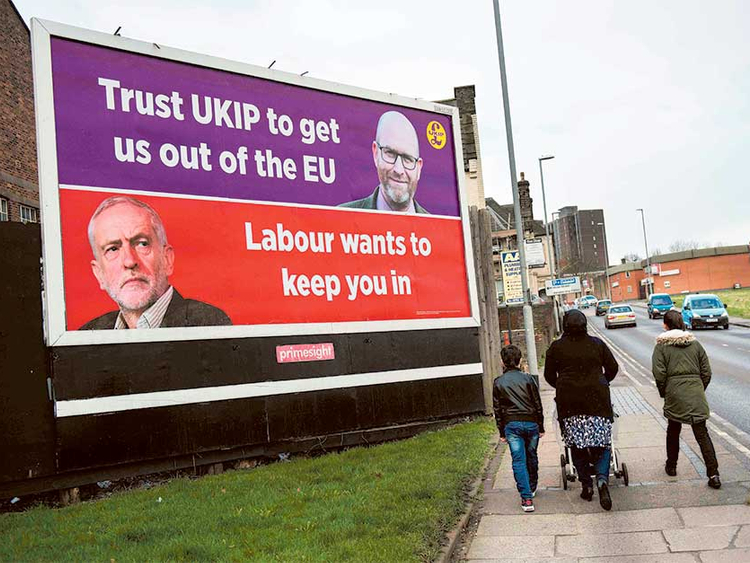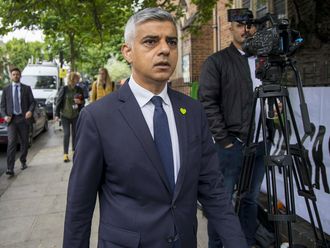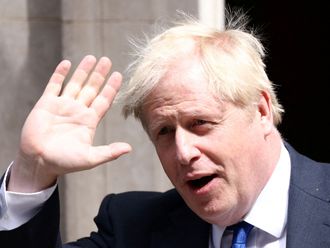Dubai: Eight months after a majority of Britons voted for their nation to leave the Euopean Union, their deicision is having a seismic effect on their national politics.
Early on Friday, Prime Minister Theresa May’s Conservatives secured a landmark victory in a parliamentary by-election, strengthening her hand ahead of Brexit negotiations as her rivals suffered damaging setbacks.
The Conservatives captured the northwestern seat of Copeland that Labour have held since 1935, the first by-election gain for a governing party for 35 years and a result that piles pressure on the opposition’s under-fire socialist leader Jeremy Corbyn.
In the central English seat of Stoke-on-Trent, Paul Nuttall, leader of the populist anti-EU UK Independence Party (Ukip), failed to overturn a Labour majority despite the fact almost 70 per cent of the city’s voters backed leaving the European Union at last year’s referendum. That cast doubt on his future too.
The Conservatives also increased their share of the vote in Stoke from the 2015 election.
The two results point to May’s tightening grip on political power following the Brexit vote, and will be used as evidence that her strategy of pursuing a clean break with the EU has stemmed rising right-wing populism without denting her ability to take votes from an increasingly left-wing Labour Party.
“The result ... is a disaster for us. We should not try to insult people’s intelligence by suggesting other than that,” Labour lawmaker John Woodcock told BBC radio.
Many Labour parliamentarians worry Corbyn’s leadership is damaging their fight for a “softer” Brexit, with closer ties to the EU’s single market, while his leftist agenda is making the party unelectable before the next national election in 2020.
“We’re actually on course to an historic and catastrophic defeat,” Woodcock said.
“This is a time where the country really needs an effective opposition and they need an alternative to what I think is a very damaging approach the Conservative government is taking on the issue of leaving the European Union.”
Other senior Labour Party figures piled the pressure on Corbyn who was eleected part leader 18 months ago, and faced a rebellion from MPs that forced him to run for re-election after just a year at the party’s helm.
Senior Labour figures have demanded that Jeremy Corbyn order a full postmortem on the party’s byelection humiliation in Copeland — amid fears that it could spark a meltdown in England comparable to Labour’s 2015 annihilation in Scotland.
Deputy leader Tom Watson and Brexit spokesperson Keir Starmer both delivered pointed criticism of Corbyn for his refusal to take any blame for the loss of the Labour stronghold, saying it was time for the leadership to undertake a thorough re-examination of the party’s entire direction.
Watson, speaking at the Scottish Labour conference in Perth, raised the spectre of the party’s virtual wipeout in Scotland being repeated south of the border, as he called for Labour to take a “long hard look at ourselves and ask what’s working” before it is too late.
Starmer, in a speech in London, said the “worst thing” Labour could do would be to “normalise defeat” and “walk past” results that were disastrous for the party and merited an honest admission that all was far from well.
Pressure on Corbyn mounted further as Gerard Coyne, who is challenging Corbyn’s close ally Len McCluskey for the leadership of the super-union Unite, weighed in. Coyne suggested in an interview with the Observer that the union was wasting its money backing a party led by Corbyn.
“The reality is that Unite has put an awful lot of money into funding a leader of the Labour party that seems to be out of step with the industrial policies and needs of our members,” Coyne said.
In an email to party supporters, Conservative Chairman Patrick McLoughlin said the result was “an important show of support” for May’s Brexit plans.
May’s spokesperson said the British leader, who took over following last year’s Brexit vote, did not have any plans to hold an early national election.
In Stoke, Ukip were unable to capitalise on the anti-establishment sentiment it tapped so successfully when persuading voters to leave the EU last year, despite pouring resources into a campaign waged on fertile Brexit territory.
The party’s former leader and best-known figure Nigel Farage had warned last week that the Stoke vote was vital for the future of the party, beset by in-fighting since the Brexit vote.
“Ukip’s time will come ... there’s a lot more to come from us, we’re not going anywhere, I’m not going anywhere,” Nuttall told reporters after the result.
A campaign dogged by personal gaffes risks reigniting feuding within the party, which has struggled to break into mainstream politics despite playing a pivotal role in forcing the government to call an EU referendum and the subsequent campaign to leave the bloc.
“If you want to be an electoral force and a political force in this country, you have to be able to win by-elections in difficult circumstances as a third party,” Rob Ford, a politics professor from Manchester University and an expert on Ukip, told Reuters.
“If they can’t do that even in the most propitious of seats, people will start to have questions.”













